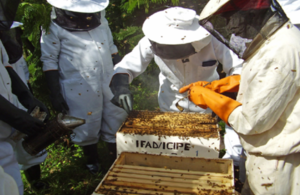DFID Research: Linking insects to forest conservation through honey and silk
A new case study highlights how communities in Mwingi, Kenya, are reducing ecosystem degradation and accelerating economic development

Picture: ICIPE
Improving forest resource management and conserving biodiversity requires a strategic mix of law enforcement and community participation. This case study illustrates how beekeeping and silk worm farming in Mwingi, eastern Kenya, have had positive impacts on agricultural productivity and conservation of the acacia forest.
The International Centre of Insect Physiology and Ecology (ICIPE) aims to alleviate poverty, ensure food security and improve the overall health status of peoples of the tropics by developing and extending management tools and strategies for harmful and useful insects, while preserving the natural resource base through research and capacity building.